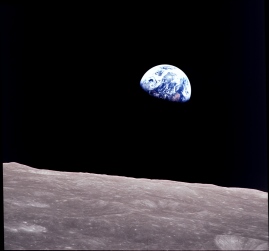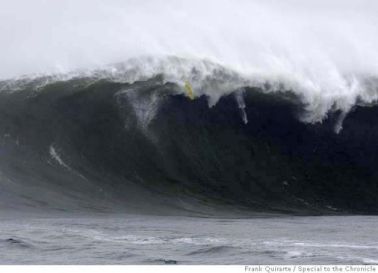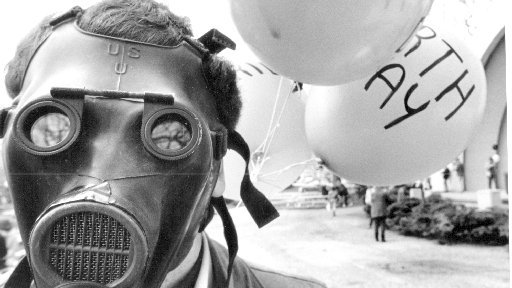Today is Earth Day, April 22, 2014. Like most Earth Days these days, a few grey-haired environmentalists may take note of the event, celebrities will tweet meaningless platitudes like Daryl Hannah’s exhortation that we should all “love your mother,” and college students will have celebrations at their campuses emphasizing individual consumer choice and the pursuit of sustainability through better technology. When did Earth Day become so irrelevant?

“Earthrise,” NASA 1968
The first Earth Day was a loose-knit, people-powered teach-in that set the stage for the “environmental decade” of the 1970s and the spate of top-down environmental regulation that followed shortly thereafter. More than anything, the original Earth Day was a moment in US history when an entire generation became environmentally self-aware and, taking a cue from the civil rights movement, demanded political action.
However since the publication of Ted Nordhouse and Michael Shellenberger’s “The Death of Environmentalism” in 2004, there has been sustained criticism, coming from within environmentalist circles, for a transformation of the movement. The consensus is that environmentalism is overly reactive, absolutist, and lacking a positive vision of the future. More recently, Anthony Weston (Mobilizing the Green Imagination, 2012) observes that the psychological impact of environmentalist messages like turning out lights in protest of climate change is that the future will be dark. Not very inspiring.
Environmental philosophers also seem to have embraced the notion of a thoroughly human-dominated future, the Anthropocene, without so much as a word about the conceptual and sociopolitical implications of entering this brave new territory. Environmental philosophy—as it was conceived in the 1970s and largely still taught across college campuses today—appears hopelessly quixotic in the face of mounting environmental crises and injustice for humans and other-than-humans alike.
 Finally, the impending effects of climate change feels like a wave at the Mavericks surf contest about to crash on puny surfers desperately trying to keep their feet on their boards for a few more seconds before being slammed mercilessly to the ocean floor.
Finally, the impending effects of climate change feels like a wave at the Mavericks surf contest about to crash on puny surfers desperately trying to keep their feet on their boards for a few more seconds before being slammed mercilessly to the ocean floor.
Do I, against the backdrop of climate change and an easy acceptance of the Anthropocene, care that today is Earth Day? I admit, I do not. But I expect that I’ll still watch “A Fierce Green Fire,” yet another documentary on the history of the modern environmental movement airing on PBS tonight while revisiting passages from Adam Rome’s exemplary history of the first and only Earth Day.
—William Grove-Fanning, enviroethics@hotmail.com

Reblogged this on Albion MI Forward Thinking and commented:
When big oil put money before the concerns of the environment.
“Taking selfies.” What a metaphor for our human situation: instead of looking outward at the Life that’s all around us, we chase after our own human reflections in each others’ eyes, technologically reified and disseminated. Maybe when we come to see the rest of our social constructions–money, nation-states, corporations–in a similar light, as merely linguistic surfaces, standing waves of belief reverberating between us human primates only for as long as we continue to believe in them–“selfies” writ large, in a sense–maybe then we will cease to be hypnotized by “them” into destroying the living Earth–something that is not merely a reflection of our own vanity!
The environmental movement seems to be floundering. I see NASA is asking everyone to take selfies, people are baking cookies and all kinds of corporations are piggy backing on earth day to turn it into something that is as you say: quite lame. Instead of selfies in front of places we love we could take selfies in front of all the chemicals the EPA has set loose …
NASA taking selfies! That’s a good one. Thanks for the feedback, Debra.